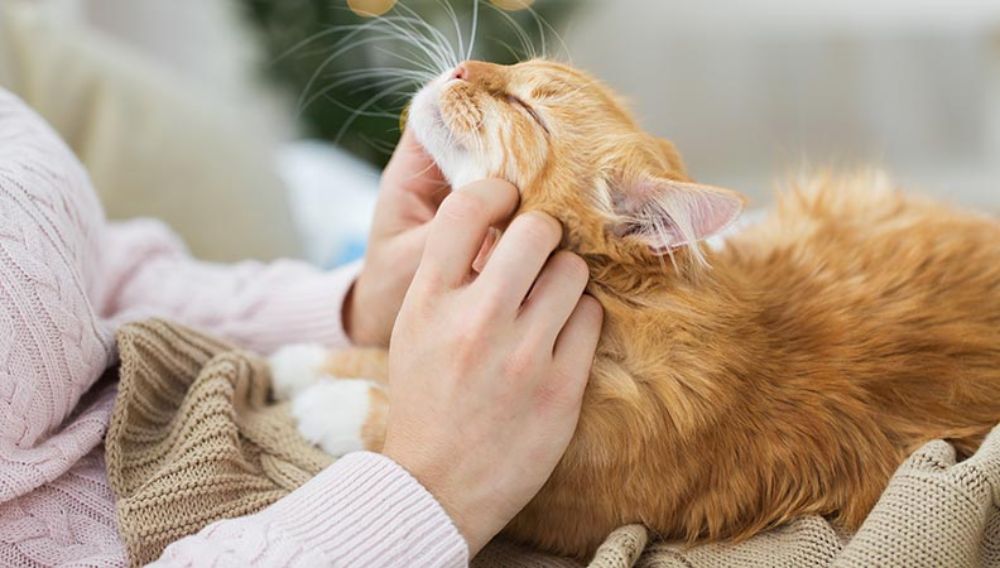
Maybe you’ve noticed your cat kneading you or objects around the home. You may have wondered: why do cats knead blankets, why do cats knead their owners, why does my cat knead me, or why do cats purr and knead?
Read on to find out all you need to know about cat kneading behaviour.
What is Cat Kneading?
Cat kneading is when your cat paddles with their front paws on soft objects or a soft surface. It’s sometimes called “making biscuits”, as the motion is similar to the motion used by us humans to knead dough when making bread! Some cats might also knead with their back paws.
Why Do Cats Like to Knead?
So, why do cats “make biscuits”? It’s important to say straight away that a kneading cat is a happy cat! Kneading is a perfectly normal and natural behaviour, and cats tend to knead when they’re happy, relaxed and feel good.
Do Kittens Knead?
Cats’ kneading starts when they’re newborn kittens. Kittens use their front paws to gently paddle against the queen’s teats to stimulate the flow of milk into their mouths.
Kittens feel safe, warm and full of milk at this time, and it may be that as adult cats they also re-experience some of these good feelings when they knead against objects or people. If your cat is kneading while you stroke or cuddle them, it’s likely they consider you a very safe and special person, and they’re enjoying a happy moment with you.
Different cats knead in different ways and to different extents. Some push really hard with their paws, alternating left, then right, and some are more gentle. Some use their claws, which can be a bit ‘ouchy’ if they do it on your lap! Others may keep their sharp claws retracted.
Why Does My Cat Knead My Blanket and Purr?
Some cats drool as they knead and may even suck on blankets or clothes while they do it. This may be related to the anticipation of milk, from when they were kittens kneading by their mother’s side.
Some cats purr while they knead, and others are quiet. Some male cats hump while kneading. We may find this a bit antisocial, but it’s normal behaviour for cats!
Just like people, all cats have different personalities and different things that make them tick! Kneading is not a behaviour to worry about; rather, it’s a sign you have a happy cat.
Do Wild Cats Knead Too?
There’s a theory that domestic cats may knead to make their bed before settling to sleep. Wild cats, like lions and tigers, have been seen doing this, and it may be that our cat’s wild ancestors would knead long grass to make a comfy place to lie down in a good sleeping spot.
Cats have scent glands in their paws, and as they knead, they’re also transferring some of their scent to the fabric or object they’re kneading. This is also a way for them to mark their territory and communicate with other cats. Queens in heat will knead as part of letting male cats know they’re ready to mate.
Is Kneading Good for Cats?
Cats are very special creatures and, despite man’s best efforts, are not that far removed from their wild ancestors. They have a large range of behavioural patterns and a secret language of their own. So, whilst we bring them into our homes and try to tame them, they do tend to continue to know their own mind and ‘do their own thing’!
This can be very frustrating at times, like when they bring in mice or scratch the furniture, but sometimes it can be rather lovely, and kneading is one of the special things that cats do to show us they are happy and enjoying our company.
Is Cat Kneading a Sign of Affection?
Kneading is an example of a healthy behaviour for cats. So, if your cat is kneading on you, you can celebrate the fact that you have the honour of being a special person in their lives. They don’t just knead on anyone!
Kneading is only one of many ways that cats communicate with us, so it’s important to also pay attention to body language and vocalising to make sure you’re listening to all that your cat is trying to tell you.
If your cat’s behaviour changes and you are worried, then always speak to your vet for advice. You know your cat best, and your vet is on hand to help or to recommend a veterinary behaviourist if necessary.
Everypaw Cat Insurance
Everypaw's Cat Insurance comes with 24/7 unlimited access to vets and vet nurses that can help with your pet's health, care, nutrition and behaviour. So you can rest assured your kitty will be well looked after.
Content provided from Vetstream's Vetlexicon Felis - www.vetlexicon.com/felis
Vetlexicon is the world’s largest peer-reviewed online clinical reference source. All our content is written and peer-reviewed by over 1,000 of the world’s leading veterinarians, ensuring relevance, accuracy and quality.
- Vetstream Ltd (online) Behavior in cats: what’s the norm? In: Vetlexicon Canis. Vetstream Ltd, UK. Website: https://www.vetlexicon.com/felis/behavior/client-factsheets/behavior-in-cats-whats-the-norm/
- Vetstream Ltd (online) Cat communication. In: Vetlexicon Canis. Vetstream Ltd, UK. Website: Cat communication in Cats (Felis) | Vetlexicon